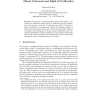Free Online Productivity Tools
i2Speak
i2Symbol
i2OCR
iTex2Img
iWeb2Print
iWeb2Shot
i2Type
iPdf2Split
iPdf2Merge
i2Bopomofo
i2Arabic
i2Style
i2Image
i2PDF
iLatex2Rtf
Sci2ools
96
Voted
CADE
1994
Springer
1994
Springer
A Completion-Based Method for Mixed Universal and Rigid E-Unification
We present a completion-based method for handling a new version of E-unification, called "mixed" E-unification, that is a combination of the classical "universal" E-unification and "rigid" E-unification. Rigid E-unification is an important method for handling equality in Gentzen-type first-order calculi, such as free-variable semantic tableaux or matings. The performance of provers using E-unification can be increased considerably, if mixed E-unification is used instead of the purely rigid version. We state soundness and completeness results, and describe experiments with an implementation of our method.
CADE 1994 | Completion-based Method | Free-variable Semantic Tableaux | Gentzen-type First-order Calculi | Logical Reasoning |
| Added | 09 Aug 2010 |
| Updated | 09 Aug 2010 |
| Type | Conference |
| Year | 1994 |
| Where | CADE |
| Authors | Bernhard Beckert |
Comments (0)

